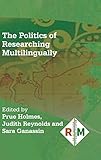The Politics of Researching Multilingually / ed. by Judith Reynolds, Prue Holmes, Sara Ganassin.
Material type: TextSeries: Researching Multilingually ; 6Publisher: Bristol ; Blue Ridge Summit : Multilingual Matters, [2022]Copyright date: ©2022Description: 1 online resource (344 p.)Content type:
TextSeries: Researching Multilingually ; 6Publisher: Bristol ; Blue Ridge Summit : Multilingual Matters, [2022]Copyright date: ©2022Description: 1 online resource (344 p.)Content type: - 9781800410145
- 9781800410152
- 404/.2072 23/eng/20211203
- P115 .P577 2022
- P115 .P577 2022
- online - DeGruyter
| Item type | Current library | Call number | URL | Status | Notes | Barcode | |
|---|---|---|---|---|---|---|---|
 eBook
eBook
|
Biblioteca "Angelicum" Pont. Univ. S.Tommaso d'Aquino Nuvola online | online - DeGruyter (Browse shelf(Opens below)) | Online access | Not for loan (Accesso limitato) | Accesso per gli utenti autorizzati / Access for authorized users | (dgr)9781800410152 |
Frontmatter -- Contents -- Acknowledgements -- Contributors -- Foreword: Towards a Reparatory Politics of Researching Multilingually -- Introduction: The Imperative for the Politics of ‘Researching Multilingually’ -- Part 1: Hegemonic Structures -- 1. Linguistic Hospitality and Listening through Interpreters: Critical Reflections and Recommendations on Linguistic Power Relationships in Multilingual Research -- 2. Multilingualism, Shifting Paradigms and the 21st Century: Negotiating Multilingual Research in Teams through the Lens of Complexity -- 3. Multilingual Researching, Translanguaging and Credibility in Qualitative Research: A Reflexive Account -- 4. Publish or Perish, publier ou périr? How Research Publication Language Choice is Shaped among Linguistics Early Career Researchers in France -- Part 2: Power Relations -- 5. Conducting Multilingual Classroom Research with Refugee Children in Cyprus: Critically Reflecting on Methodological Decisions -- 6. Voice and Power Relations: Researching Multilingually with Multilingual Children in Mauritian Pre-primary School -- 7. Challenges for Researchers Investigating Coloniality Multilingually in Complex Linguistic Contexts in the Caribbean -- 8. Speaking Marathi Like a Punekar: Learning Class and Caste in India -- Part 3: Decolonizing Methodologies -- 9. Multilingual Research for New Social Realities: Towards a Transdisciplinary Approach -- 10. Transcribing (Multilingual) Voices: From Fieldwork to Publication -- 11. Interpreting Cognitive Justice: A Framework for Interpreters as Co-researchers in Postcolonial Multilingual Research -- 12. Bilingual Theatre in British Sign Language and English: A Reflection on the Challenges Faced During a Doctoral Applied Theatre Project -- Part 4: Decolonizing Languages -- 13. Translanguaging Pedagogy as Methodology: Leveraging the Linguistic and Cultural Repertoires of Researchers and Participants to Mutually Construct Meaning and Build Rapport -- 14. Decolonizing Research through Translanguaging: Negotiating Practices with Multilingual Teachers in Colombia -- 15. The (Hidden) Politics of Language Choice in Research on Multilingualism: Moments of (Dis)Empowerment -- 16. Speaking ‘No Language?’: Reflections on (Il)Legitimate Multilingualism from Fieldwork in Gagauzia -- Afterword -- Index
restricted access online access with authorization star
http://purl.org/coar/access_right/c_16ec
This book offers a unique understanding of how researchers’ linguistic resources, and the languages they use, are politically and structurally constrained, with implications for the reliability of the research. The book will help readers to make theoretically and methodologically informed choices about the political dimensions of their research.
Mode of access: Internet via World Wide Web.
In English.
Description based on online resource; title from PDF title page (publisher's Web site, viewed 25. Jun 2024)


